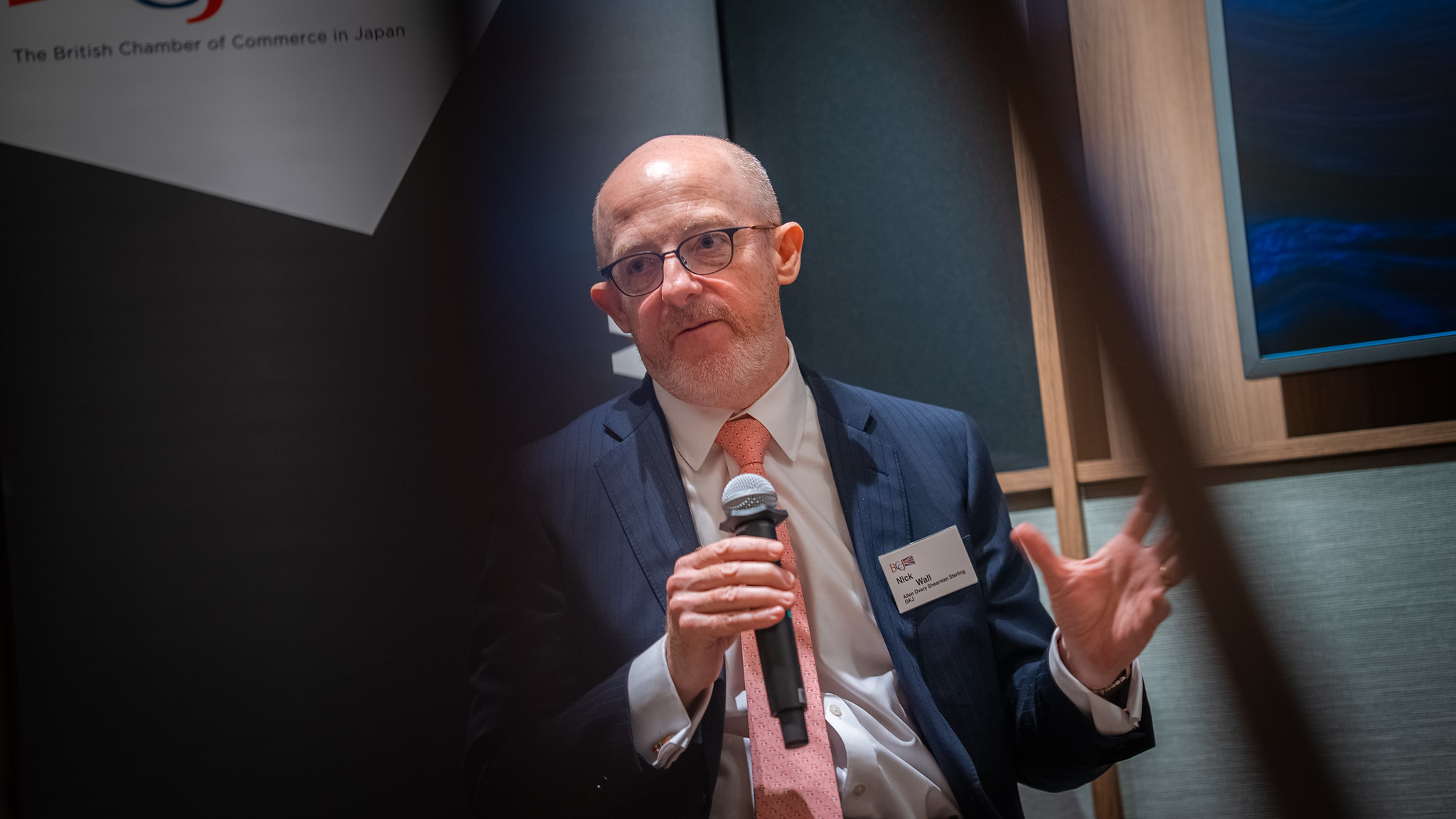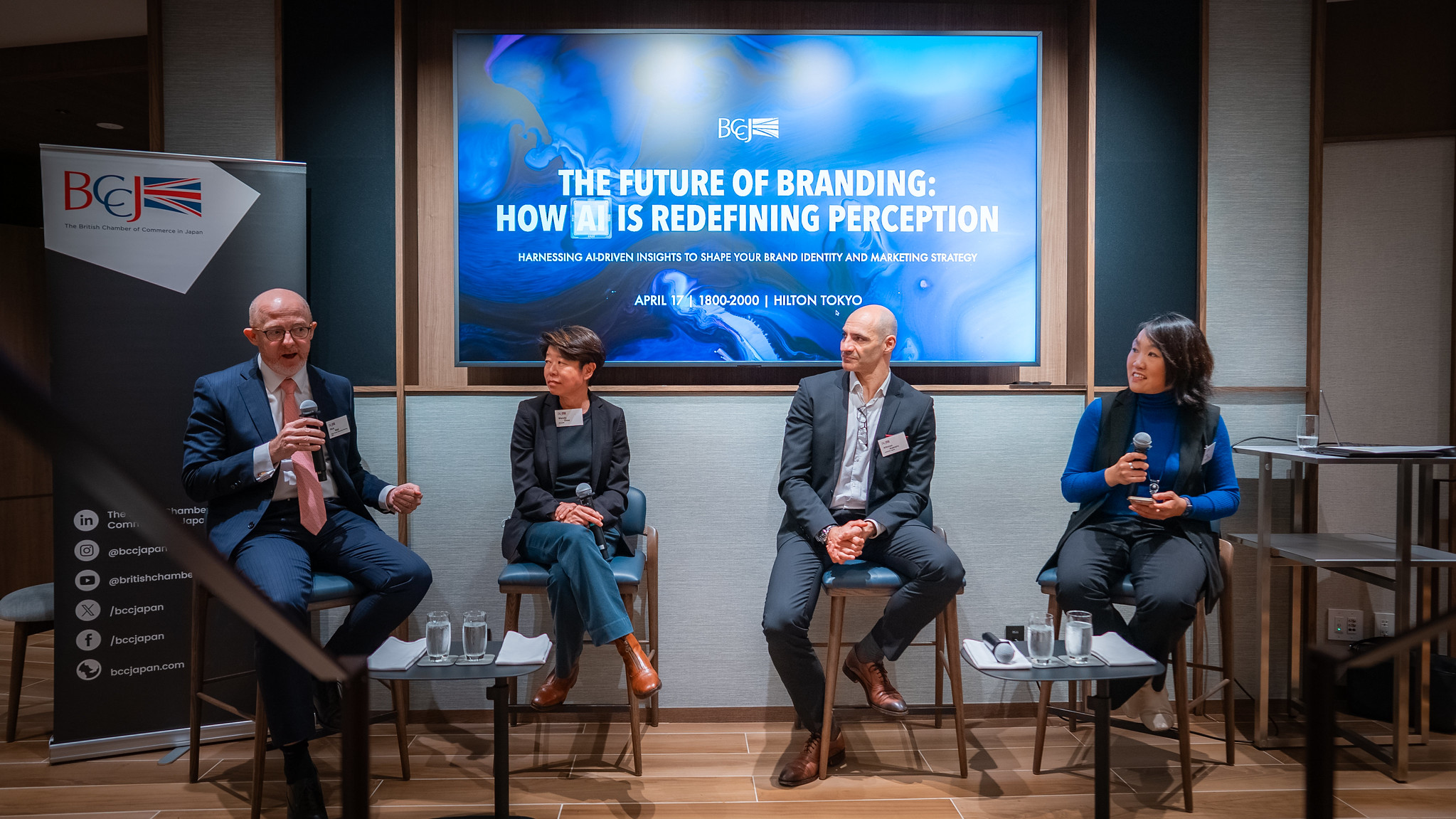The Future of Branding: How AI is Redefining Perception
With more than 90% of online experiences starting with a search engine, which are being enhanced with AI-powered large language models (LLMs), how consumers discover and interact with brands is changing.
Understanding how LLMs (a type of artificial intelligence that processes, understands and generates human language based on training using massive volumes of text) impact customer acquisition and learning what influences a brand’s visibility online can help businesses stay ahead of the curve.
With this in mind, The British Chamber of Commerce in Japan hosted an event on harnessing AI-driven insights to shape brand identity and marketing strategy. The expert speakers were Alfonso Asensio, Managing Director of digital transformation firm Jellyfish Japan; Wendy Siew, Chief Senior Vice President of marketing and communications firm WPP Japan; and Nick Wall of global law firm A&O Shearman.
Understanding LLMs
Jellyfish’s Asensio opened the session by introducing details of the various LLMs, adding that it’s important—as both business people and consumers—to understand “who owns them, how they are trained and how they think” due to their “tremendous influence.”
Google-owned Gemini, for example, has 1 billion users in 100 countries, while Meta AI, a chatbot designed by Meta as a personal assistant integrated into its Facebook and Instagram platforms, has 600 million monthly users. OpenAI-owned ChatGPT, meanwhile, has 300 million monthly users.
“LLMs are now the intermediary between you and the brand,” he explained, pointing out that if consumers ask Google a question, Gemini content is presented at the top of all searches, even above paid advertising.
This development has prompted a rethink of advertising, according to WPP’s Siew, who said consumers once searched for products on websites, resulting in companies buying advertising and using keywords on those sites.
Now, with 66% of 18–24-year-olds asking AI models to make a recommendation about a brand, product or service, according to a recent YouGov survey, the “user doesn’t decide anymore,” she said. “The model is deciding, so the point of entry for the consumer is really different.”

With market demand at stake, Jellyfish’s platform Share Model helps its clients understand how their brands are presented by LLMs, including mention rate, extent of recommendation and average position.
When considering an airline, for example, “most people will decide on the first or second one listed” by the model but “not every model will consider the brand in the same way,” Asensio said. Share Model, therefore, helps companies become more aware of what different LLMs are saying about their brands and why.
One factor is the owner of the LLM, he continued: “We have to be mindful that the models aren’t neutral. When you’re looking at the information they provide, you have to think, what is the interest behind it. The companies have invested in the models and want a return for that investment that is aligned with their business models.”
To perform better in LLMs, brands need to be present “where the models can see them,” he added, noting that companies that seek to engage with consumers on Google should prioritise improving their presence on Gemini. This can be achieved by being aware that “everything—from press releases to comments left by consumers—generates a paper trail, which is converted into insights for people who ask the models questions.”
Regulation and risk
A&O Shearman’s Wall outlined the various approaches to regulation of LLMs, much of which is being driven by the right to data protection and “the right to be forgotten.” Despite the obligation, in general, on companies to delete personal data if requested, personal data used to train LLMs, can never be deleted from the LLM, he said.
This is one of the factors driving the AI policy of the European Union, which is at the forefront of global efforts attempting to regulate AI, he explained. Singapore and the United States, on the other hand, have demonstrated a preference for a “light touch” approach to avoid “hindering innovation.” Japan, meanwhile, in the current Diet session aims to pass the AI Promotion Bill, which intends to promote the development of AI whilst taking steps to mitigate risks. The Bill is expected to be enacted by the end of June 2025.

Wall said a “common sense approach on whether data is sensitive” is required, citing the example that purchasing behaviour is less important than medical or financial information. Use of LLMs could generate biases in activities such as recruitment if historical data is used as the basis of who to hire, he added.
Asked how to manage risk related to LLMs, he said users are exposed to the lowest level of risk, which rises for “deployers” (defined by the European Union as an individual or entity that uses an AI system within their professional scope) and rises again for the producers and developers of LLMs.
For example, with the use of LLMs in cancer screening, Wall questioned who would be responsible if a diagnosis is missed. In the financial planning industry, meanwhile, he considered the repercussions if someone follows the advice generated from an LLM, which turns out to be incorrect, or if the LLM provides different information to different people.
“The case law is underdeveloped,” he added, noting that there “is probably a market—perhaps an insurance-led market—that needs to develop to address the risks of AI in the next few years.”
Copyright, environmental considerations
Some consider visuals produced by AI to have no copyright because they lack a human creator. But Siew pointed out that in the case of someone using Gemini or EverGen AI to create visuals, images could be automatically “scraped” from a website or online platform and used without the original creator’s permission.
“We need education, awareness and policies—including internally—so teams really understand what tools they are using and how they are using them,” she said.
“If staff who are handling a lot of client data about brands, such as a product launch calendar, marketing plans or ROI details, feed that data into an LLM to generate a report, that’s potentially a breach,” she continued, adding that WPP channels such information into internal tools to ensure they are compliant.

Amid the trend of turning someone into an action figure using LLMs, Asensio noted that the energy consumption the trend worldwide is similar to the same amount of energy required to power 20,000 homes for six months, calling on users and companies to be “mindful of the impact we are having with the models,” due to their high levels of energy and water consumption.
Looking ahead, he predicted that the next evolution of LLMs will be AI agents to act as an individual’s personal assistant, personal shopper or business planner, adding that he expects it to be “a big trend of development in the near future.”

